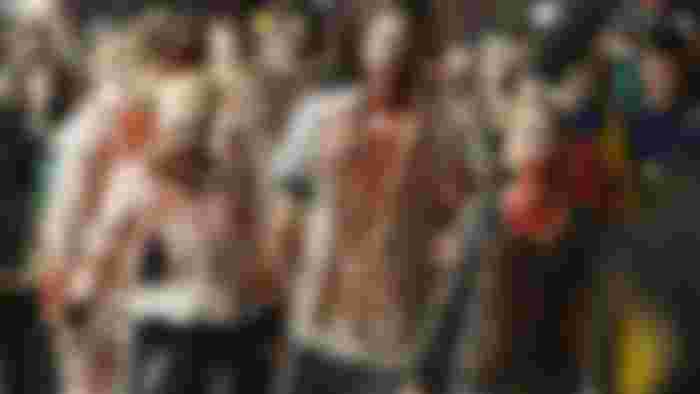
A zombie (Haitian French: zombi, Haitian Creole: zonbi) is a fictional undead corporealrevenant created through the reanimation of a corpse. Zombies are most commonly found in horror and fantasy genre works. The term comes from Haitian folklore, in which a zombie is a dead body reanimated through various methods, most commonly magic. Modern depictions of the reanimation of the dead do not necessarily involve magic but often invoke science fictional methods such as carriers, radiation, mental diseases, vectors, pathogens, parasites, scientific accidents, etc.[1][2]
The English word "zombie" was first recorded in 1819, in a history of Brazil by the poet Robert Southey, in the form of "zombi".[3] The Oxford English Dictionary gives the word's origin as West African and compares it to the Kongo words nzambi (god) and zumbi(fetish). A Kimbundu-to-Portuguese dictionary from 1903 defines the related word nzumbi as soul,[4] while a later Kimbundu–Portuguese dictionary defines it as being a "spirit that is supposed to wander the earth to torment the living".[5]
One of the first books to expose Western culture to the concept of the voodoo zombie was The Magic Island (1929) by W. B. Seabrook. This is the sensationalized account of a narrator who encounters voodoo cults in Haiti and their resurrected thralls. Timecommented that the book "introduced 'zombi' into U.S. speech".[6] Zombies have a complex literary heritage, with antecedents ranging from Richard Matheson and H. P. Lovecraft to Mary Shelley's Frankenstein drawing on European folklore of the undead. Victor Halperin directed White Zombie (1932), a horror film starring Bela Lugosi. Here zombies are depicted as mindless, unthinking henchmen under the spell of an evil magician. Zombies, often still using this voodoo-inspired rationale, were initially uncommon in cinema, but their appearances continued sporadically through the 1930s to the 1960s, with films including I Walked with a Zombie (1943) and Plan 9 from Outer Space (1959).
A new version of the zombie, distinct from that described in Haitian folklore, emerged in popular culture during the latter half of the 20th century. This interpretation of the zombie is drawn largely from George A. Romero's film Night of the Living Dead (1968),[1] which was partly inspired by Richard Matheson's novel I Am Legend (1954).[7][8] The word zombie is not used in Night of the Living Dead, but was applied later by fans.[9] The monsters in the film and its sequels, such as Dawn of the Dead (1978) and Day of the Dead (1985), as well as many zombie films it inspired, such as The Return of the Living Dead (1985) and Zombi 2 (1979), are usually hungry for human flesh, although Return of the Living Deadintroduced the popular concept of zombies eating brains. The "zombie apocalypse" concept, in which the civilized world is brought low by a global zombie infestation, has since become a staple of modern popular art. After zombie films such as Dawn of the Dead and Michael Jackson's music video Thriller (1983), the genre waned for some years.
In the Far East during the late 1990s, the Japanese zombie video games Resident Eviland The House of the Dead led to a resurgence of zombies in popular culture. Additionally, The House of the Deadintroduced a new type of zombie distinct from Romero's slow zombies: the fast-running zombie. These games were followed by a wave of low-budget Asian zombie films such as the zombie comedy Bio Zombie (1998) and action film Versus (2000), and then a new wave of Western zombie films in the early 2000s, including films featuring fast-running zombies such as 28 Days Later (2002), the Resident Evil and House of the Dead films, and the 2004 Dawn of the Dead remake, while the British film Shaun of the Dead (2004) was in the zombie comedy subgenre.
The late 2000s and 2010s saw the humanization and romanticization of the zombie archetype, with the zombies increasingly portrayed as friends and love interests for humans. Notable examples of the latter include movies Warm Bodies and Zombies, novels American Gods by Neil Gaiman, Generation Dead by Daniel Waters, and Bone Song by John Meaney, animated movie Corpse Bride, TV series Pushing Daisies and iZombie, and manga/novel/animeseries Sankarea: Undying Love and Is This a Zombie? In this context, zombies are often seen as stand-ins for discriminated groups struggling for equality, and the human–zombie romantic relationship is interpreted as a metaphor for sexual liberation and taboo breaking (given that zombies are subject to wild desires and free from social conventions.

Actually I love Zombie's movie and who loves this movies too?
Thanks for Visiting. God Bless.


now.i know.